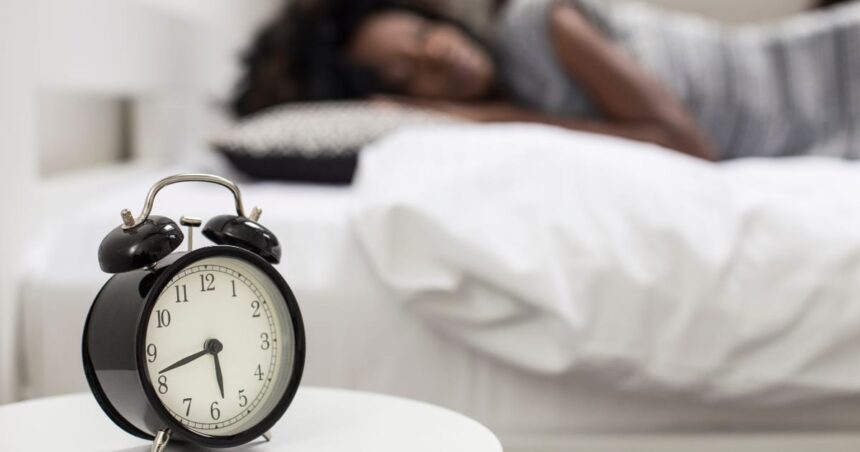Melatonin is a typical, over-the-counter sleep assist many individuals take to assist them fall and keep asleep at evening. Nonetheless, the drug can have unwanted side effects.
Can individuals with diabetes safely take melatonin to sleep higher?
This text will let you know the whole lot that you must find out about melatonin and diabetes.
What’s melatonin?
Melatonin is a naturally occurring hormone that your mind produces in response to darkness. It helps with the timing of your each day circadian rhythms. At evening, it will possibly make it easier to sleep.
Whenever you’re uncovered to mild at evening, it blocks the mind from producing melatonin. That’s the reason you’re extra prone to keep up late if you happen to’ve been watching late-night tv.
Individuals can take synthetically produced, over-the-counter melatonin each day to assist them sleep. This may be particularly useful in case your mind doesn’t produce sufficient melatonin by itself.
Melatonin is taken into account one of many most secure sleep drugs you may take, however it does have potential unwanted side effects.
The unwanted side effects of utilizing melatonin within the short-term embody:
- Headache
- Dizziness
- Nausea
- Sleepiness
It’s endorsed that most individuals take between 1-3 mg of melatonin earlier than bedtime.
Taking 5 mg or extra has been related to the triggering of complications and migraines in some individuals.
Speak along with your physician about their really helpful dose for you.
The long-term unwanted side effects of melatonin use are unclear. Extra research must be accomplished to find out potential long-term reactions to the treatment.
How does melatonin work?
Melatonin shouldn’t be a hypnotic, which is what typical medication that deal with insomnia are known as.
Since melatonin is of course occurring within the physique, taking extra melatonin will assist your physique in regulating its circadian rhythms.
The circadian rhythm is the physique’s 24-hour clock.
Melatonin works physiologically by detoxifying free radicals. This aids in antioxidant motion, bone improvement and safety, copy, cardiovascular, immune, and physique mass regulation.
There may be additionally proof that melatonin could assist the mind and enhance gastrointestinal functioning in addition to psychiatric and cardiovascular issues.
However what does this all imply for individuals with diabetes?
Can individuals with diabetes take melatonin?
Most individuals with diabetes can take melatonin safely.
Nonetheless, at all times discuss along with your physician earlier than beginning any new treatment, even when it’s over-the-counter.
Taking melatonin has been related to improved insulin resistance when mixed with train—together with improved antioxidant actions, hyperlipidemia, and inflammatory cytokines.
One other research famous that glucose tolerance and insulin sensitivity improved in research topics taking exogenous melatonin as nicely.
Moreover, mice confirmed improved insulin sensitivity by taking melatonin with out relying on weight reduction.
This proof exhibits that melatonin can contribute to sort 2 diabetes administration by inducing insulin secretion and enhancing β-cell operate.
This will enhance blood sugar and A1C ranges and insulin resistance in individuals with diabetes.
Melatonin might also assist enhance diabetes problems, together with hypertension, cardiomyopathy, retinopathy, wound therapeutic, renal illness, and neuropathy.
Whereas melatonin ought to solely be taken over the brief time period, it’s confirmed to be secure and efficient and should supply many well being advantages as nicely.
Does melatonin have an effect on blood sugar ranges?
Whereas taking melatonin over an extended time frame can have optimistic results on fasting blood sugars and A1C, taking melatonin sometimes earlier than mattress that will help you sleep is not going to drastically enhance or lower your blood sugar ranges.
Taking melatonin every so often is not going to require insulin for top blood sugars or meals to deal with low blood sugars.
Nonetheless, contact your physician to debate therapy choices and alternate options to melatonin if you happen to’re experiencing low or excessive blood sugar ranges from taking melatonin.
Can you’re taking an excessive amount of melatonin?
Sure, and overdosing on melatonin is feasible.
A typical grownup dose can vary wherever from 1-10 mg per evening. Nonetheless, taking 30 mg or extra could cause extreme hostile unwanted side effects.
The unwanted side effects of taking an excessive amount of melatonin embody:
- Extreme sleepiness
- Vomiting
- Hassle respiration
- Headache or migraines
- Low blood strain
- Gastrointestinal issues
- Modifications in hormone ranges
- Temper swings
Kids are particularly inclined to overdoses.
Name your physician immediately or search emergency medical consideration if you happen to suspect you or your youngster has overdosed on melatonin.
Overdosing on melatonin could cause critical unwanted side effects and may even be deadly.
Who ought to keep away from melatonin?
At all times discuss to your physician earlier than you or your youngster begins taking melatonin.
You shouldn’t take melatonin if:
- In case you are pregnant or breastfeeding
- You could have an autoimmune dysfunction (discuss along with your physician)
- You could have hypertension (discuss along with your physician)
- You wrestle with despair
- You could have a seizure dysfunction
In case you are below 18, search steering out of your physician if you happen to want to take melatonin.
Can kids with diabetes take melatonin?
Many kids will reply to a low dose of melatonin (between 0.5-1 mg) when taken between 30 and 90 minutes earlier than bedtime.
A baby having diabetes (sort 1 or sort 2 diabetes) is not going to have an effect on whether or not or not they will or ought to take melatonin.
Speak along with your pediatrician concerning the correct dose and timing of melatonin in case your youngster is having hassle sleeping.
Is melatonin addictive?
Based on sleep specialists and researchers, melatonin shouldn’t be addictive.
There isn’t a proof that individuals develop into bodily depending on the complement, and also you received’t develop withdrawal signs if you happen to cease taking it.
Nonetheless, if you happen to discover that you simply’re taking melatonin for a number of weeks or a month and your sleep shouldn’t be enhancing, otherwise you discover that you simply can not sleep with out taking it, you need to discuss to your physician.
Can I get melatonin from meals?
Sure! For some individuals, taking exogenous melatonin in capsule kind may be too sturdy.
You too can get melatonin from the meals you eat.
The next meals include melatonin naturally:
- Bananas
- Cherries
- Milk
- Fish
- Walnuts
- Kiwi
- Eggs
- Pistachios
- Almonds
- Oatmeal
- Cashews
- Sardines
- Grapes
- Salmon
- Cherry juice
- Sunflower seeds
- Mushrooms
Consuming any of those meals a number of hours earlier than mattress could enhance your sleep high quality.
This generally is a nice various if you don’t want to take melatonin in capsule kind.
Are there alternate options to melatonin?
There are a lot of alternate options to taking melatonin.
At all times discuss to your physician if you happen to’re fascinated by a prescription sleep treatment as an alternative of taking melatonin.
A prescription drug known as ramelteon is particularly designed to imitate the consequences of melatonin within the physique.
Nonetheless, along with melatonin-rich meals, the next pure methods could make it easier to sleep at evening:
- Turning your bed room temperature all the way down to 68 levels Fahrenheit
- Stopping all caffeine consumption at the least 8 hours earlier than mattress
- Exercising each day, however not at evening
- Taking a heat bathtub earlier than mattress
- Turning off the tv (and different screens with blue mild) a number of hours earlier than mattress
- Not consuming too near bedtime
- Consuming decrease carbohydrate, increased protein meals within the night
- Not consuming an excessive amount of water earlier than mattress (to forestall having to make use of the restroom in the midst of the evening)
- Having fun with a cup of natural tea at evening
- Utilizing black-out curtains for a very darkish bed room
- Avoiding alcohol
Moreover, pure dietary supplements and nutritional vitamins, together with magnesium, valerian root, l-theanine, chamomile, and passionflower, may help assist in sleep as nicely.










